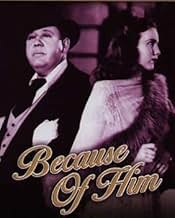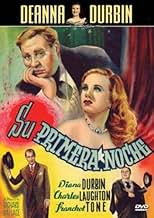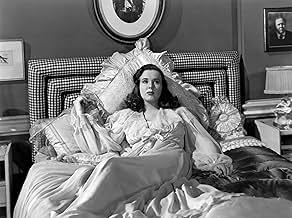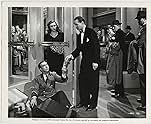A young woman who wants to break into the theater schemes to become the protege of a famous Broadway star.A young woman who wants to break into the theater schemes to become the protege of a famous Broadway star.A young woman who wants to break into the theater schemes to become the protege of a famous Broadway star.
- Awards
- 3 wins total
Joan Shawlee
- Autograph Seeker
- (as Joan Fulton)
John Alban
- Party Guest
- (uncredited)
George Anderson
- Detective
- (uncredited)
Bobby Barber
- Stagehand
- (uncredited)
Brooks Benedict
- Theatre Patron
- (uncredited)
Helen Bennett
- Reporter
- (uncredited)
Edward Biby
- Hotel Guest
- (uncredited)
Gladys Blake
- Mabel
- (uncredited)
Barbara Brewster
- Elevator Passenger
- (uncredited)
Featured reviews
I enjoyed the movie apart from Tone's character (he was annoying and super cheesy) the rest was great. Laughton is as always the best part about the picture.
The fact that credibility is strained to the limits is not unusual in most of the Deanna Durbin films of this period. "Because of Him" is no exception--with a charming performance by Deanna and an excessively hammy one (intentionally so) by Charles Laughton. Both prove they have a way with comedy--as does Franchot Tone as a playwright who does not want Durbin to star in his new show. While the thin plot hinges on whether or not Deanna is successful in seeking the patronage of famous actor (Laughton) and starring in the theater, there is an air of mirth in the proceedings with just the right light touch to keep the story spinning to a happy ending.
Deanna, as usual, is in fine voice and gives a lovely rendition of "Danny Boy" and tosses off an operatic aria under most unusual circumstances. Her voice is showcased here and so is her comic timing. Easy to see why she was such a popular favorite in the '40s.
Deanna, as usual, is in fine voice and gives a lovely rendition of "Danny Boy" and tosses off an operatic aria under most unusual circumstances. Her voice is showcased here and so is her comic timing. Easy to see why she was such a popular favorite in the '40s.
10Larkrise
As a previous reviewer remarked regarding this fine film obviously has no knowledge of what a legend Deanna Durbin is with her singing voice she literally saved Universal studios from bankruptcy with her very first film at about the age of 14. With that first film Three Smart Girls she went on to have a very successful career till the age of about 27 when she retired and now lives happily in seclusion in France. Because of Him is the story of an ambitious waitress who dreams of being on the stage and with a little trickery on her side achieves her dream with the starring role of her first play much to the chagrin of the plays writer who thinks she is totally wrong for the part, but as with most of her films it comes right at the end.
Deanna is such a sweet, old fashioned woman, she was about 23 in "Because of him". Deanna was 13 in her first appearance with Judy Garland in the short "Every Sunday" 1936, and that came out 10 years prior to "Because I know him" 1946. Deanna blossomed into a beautiful young woman in her 1940s films such as this one. And her voice is wonderful again here singing her lovely opera songs especially the tear-jerker "Danny boy".
The golden age had some beautiful operatic singing women, Janette McDonald in the 1930s and early 1940s, and Kathryn Grayson and Deanna Durban in the 1940s. All angels
Deanna had a deep admiration for John and wanted to star in his show so badly that she folded a letter that she typed herself about being invited to star in John's show, and asked him for his autograph with him only seeing the side of the paper without the letter showing. Since Deanna was waitressing and John was a customer at the restaurant she waitressed at, she was able to pull it off with John not discovering until later what she'd done. John did take it better than many characters of his sort in these types of films would take it. Generally, he took it well enough to remain calm and sympathetic towards Deanna and to keep her scheming move quiet and between only the two of them. But he didn't take it well enough to actually grant her wish to star in his show, and bluntly advised her to go back to her home town. Then Deanna, well at least her friends and family, did not keep the next plot point quiet. They publicised in the newspaper that she attempted suicide due to John's rejecting her for his show.
John's reaction to that, like with the autograph/letter scheme, was lighter than one would've expected, and he then really developed a soft spot for her innocence and determination. After that came Deanna's beautiful "Danny boy", and Deanna and John were not the only ones without dry eyes. I have a sentimental side to Golden age music, it's simply got a sweetness and charm to it that no modern music can match. Deanna Durban, Kathryn Grayson, Janette McDonald, Judy Garland, Nelson Eddie, Allen Jones, Dick Powell's singing, Ginger Rogers, Jean Harlow, Ruby Keeler, Clark Gable, Gene Kelly, Cary Grant's acting and charm, along with many others' singing, acting, sweetness, and charm have all helped to have made the pre-mid-1950s age a wonderful place
The golden age had some beautiful operatic singing women, Janette McDonald in the 1930s and early 1940s, and Kathryn Grayson and Deanna Durban in the 1940s. All angels
Deanna had a deep admiration for John and wanted to star in his show so badly that she folded a letter that she typed herself about being invited to star in John's show, and asked him for his autograph with him only seeing the side of the paper without the letter showing. Since Deanna was waitressing and John was a customer at the restaurant she waitressed at, she was able to pull it off with John not discovering until later what she'd done. John did take it better than many characters of his sort in these types of films would take it. Generally, he took it well enough to remain calm and sympathetic towards Deanna and to keep her scheming move quiet and between only the two of them. But he didn't take it well enough to actually grant her wish to star in his show, and bluntly advised her to go back to her home town. Then Deanna, well at least her friends and family, did not keep the next plot point quiet. They publicised in the newspaper that she attempted suicide due to John's rejecting her for his show.
John's reaction to that, like with the autograph/letter scheme, was lighter than one would've expected, and he then really developed a soft spot for her innocence and determination. After that came Deanna's beautiful "Danny boy", and Deanna and John were not the only ones without dry eyes. I have a sentimental side to Golden age music, it's simply got a sweetness and charm to it that no modern music can match. Deanna Durban, Kathryn Grayson, Janette McDonald, Judy Garland, Nelson Eddie, Allen Jones, Dick Powell's singing, Ginger Rogers, Jean Harlow, Ruby Keeler, Clark Gable, Gene Kelly, Cary Grant's acting and charm, along with many others' singing, acting, sweetness, and charm have all helped to have made the pre-mid-1950s age a wonderful place
Deanna Durban (Miss Walker) tricks her way into starring in playwright Franchot Tone's (Paul Taylor) new play opposite famous actor Charles Laughton (John Sheridan). She has no acting experience, but while Laughton encourages her, Tone is keen to see her fail and removes his name from the performance's credits.
This film is a comedy that has several amusing moments, eg, Laughton's treatment of his butler Donald Meek (Martin), and his scene with Durban when he teaches her how to fake a faint properly. Charles Laughton is the powerhouse of the film with an over-the-top performance that works. The film is only let down by Durban's terrible singing of "Danny Boy". She has 3 songs, which she delivers in that high-pitched, operatic, warbly voice - two of them are okay but "Danny Boy" - just shut up Durban! The song is already crap and your rendition of it is really painful to endure. The film loses momentum at this point.
Anyway, the singing of "Danny Boy" provides an important stage in the plot as, after Durban has tortured us with this flop of a song, Laughton becomes sympathetic to her wishes and decides to help her. God knows why. The fact that she can sing is not an indication that she can act. So he behaves out of character and his sudden confidence in her makes no sense.
The film is essentially a romance that doesn't really convince but it is entertaining viewing. Whilst the songs in this film are not needed, the film is lightweight fluff that doesn't make a lot of sense but it has some funny moments and the cast all perform well.
This film is a comedy that has several amusing moments, eg, Laughton's treatment of his butler Donald Meek (Martin), and his scene with Durban when he teaches her how to fake a faint properly. Charles Laughton is the powerhouse of the film with an over-the-top performance that works. The film is only let down by Durban's terrible singing of "Danny Boy". She has 3 songs, which she delivers in that high-pitched, operatic, warbly voice - two of them are okay but "Danny Boy" - just shut up Durban! The song is already crap and your rendition of it is really painful to endure. The film loses momentum at this point.
Anyway, the singing of "Danny Boy" provides an important stage in the plot as, after Durban has tortured us with this flop of a song, Laughton becomes sympathetic to her wishes and decides to help her. God knows why. The fact that she can sing is not an indication that she can act. So he behaves out of character and his sudden confidence in her makes no sense.
The film is essentially a romance that doesn't really convince but it is entertaining viewing. Whilst the songs in this film are not needed, the film is lightweight fluff that doesn't make a lot of sense but it has some funny moments and the cast all perform well.
Did you know
- TriviaDeanna Durbin was pregnant during the filming of this movie. In order to disguise her condition, costumers fitted her with dark colored outfits in front of which she carried, first, a decoratively jeweled hand muff, and later, an extravagant fur hand muff.
- ConnectionsFeatured in Danny Boy: The Ballad That Bewitched the World (2013)
Details
- Runtime1 hour 28 minutes
- Color
- Aspect ratio
- 1.37 : 1
Contribute to this page
Suggest an edit or add missing content




































